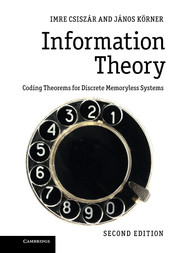Book contents
- Frontmatter
- Contents
- Preface to the first edition
- Preface to the second edition
- Basic notation and conventions
- Introduction
- Part I Information measures in simple coding problems
- Part II Two-terminal systems
- Part III Multi-terminal systems
- References
- Name index
- Index of symbols and abbreviations
- Subject index
Preface to the second edition
Published online by Cambridge University Press: 05 August 2012
- Frontmatter
- Contents
- Preface to the first edition
- Preface to the second edition
- Basic notation and conventions
- Introduction
- Part I Information measures in simple coding problems
- Part II Two-terminal systems
- Part III Multi-terminal systems
- References
- Name index
- Index of symbols and abbreviations
- Subject index
Summary
When the first edition of this book went to print, information theory was only 30 years old. At that time we covered a large part of the topic indicated in the title, a goal that is no longer realistic. An additional 30 years have passed, the Internet revolution occurred, and information theory has grown in breadth, volume and impact. Nevertheless, we feel that, despite many new developments, our original book has not lost its relevance since the material therein is still central to the field.
The main novelty of this second edition is the addition of two new chapters. These cover zero-error problems and their connections to combinatorics (Chapter 11) and information-theoretic security (Chapter 17). Of several new research directions that emerged in the 30 years between the two editions, we chose to highlight these two because of personal research interests. As a matter of fact, these topics started to intrigue us when writing the first edition; back then, this led us to a last-minute addition of problems on secrecy.
Except for the new chapters, new results are presented only in the form of problems. These either directly complete the original material or, occasionally, illustrate a new research area. We made only minor changes, mainly corrections, to the text of the original chapters. (Hence the words recent and new refer to the time of the first edition, unless the context indicates otherwise.) We have updated the history part of each chapter and, in particular, we have included pointers to new developments.
- Type
- Chapter
- Information
- Information TheoryCoding Theorems for Discrete Memoryless Systems, pp. xiPublisher: Cambridge University PressPrint publication year: 2011
- 1
- Cited by



